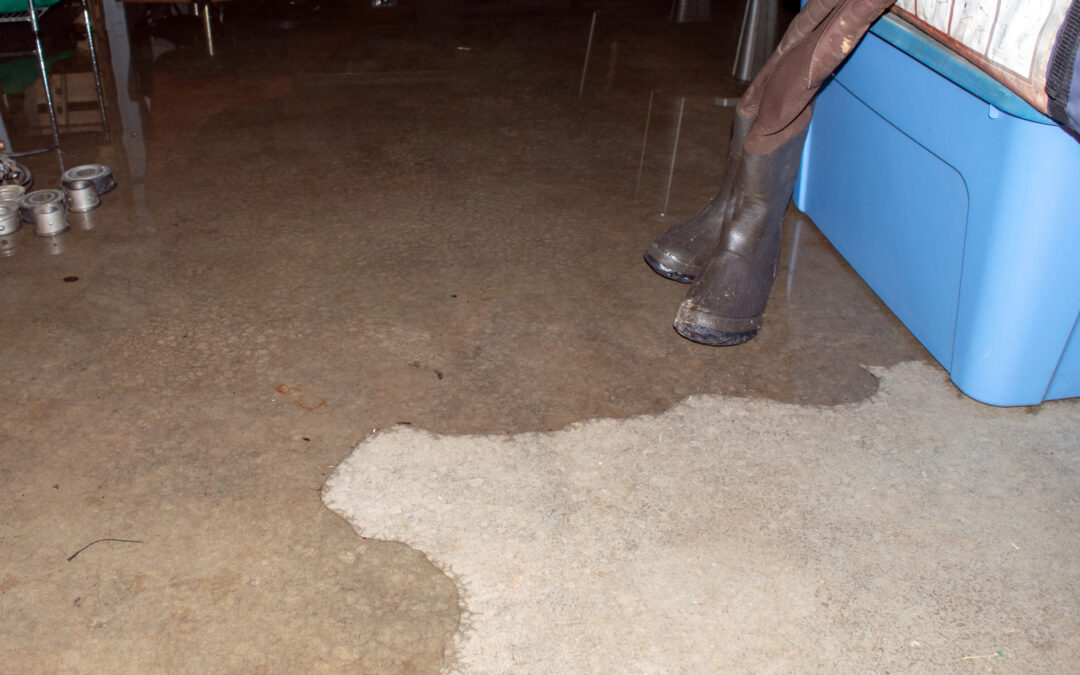Imagine this: you’re taking a quick trip down to the basement to grab some family photos and realize that you’ve stepped into a puddle. Water has found its way into your basement, damaging your basement walls, flooring, and any belongings at water level. It’s a homeowner’s nightmare that no one wants to deal with.
Basement flooding can be an expensive repair, requiring a professional’s help and expertise. Luckily, basement floods can be prevented if homeowners take a few precautionary measures to discourage them. Keep reading to learn what causes basement flooding and how your gutters may be to blame, plus some solutions.
What Causes Basement Flooding?
Water that makes its way into the basement must be from a faulty foundation and excess water, right? Unfortunately, it’s not that simple to find the source of the flood since many different things can cause basement flooding. However, basement flooding most often occurs from clogged gutters.
Gutter systems exist to carry water away from the roof and direct it away from the home’s foundation. Unfortunately, not all gutter systems work well to keep water flowing freely throughout the system, resulting in clogs and creating the threat of basement flooding. Below are a few ways clogged gutters lead to basement flooding:
Clogs
As previously mentioned, clogs ultimately lead to other mishaps with the gutter system and can damage your home’s landscaping and cause basement floods. The inside of an open-top gutter system is completely exposed, allowing debris like leaves, twigs, and even pests to enter the gutter. Failure to clean the gutters often results in a build-up of debris, impeding water flow and creating a slew of issues mentioned below.
Overflowing Gutters
Gutters will overflow if they’re clogged, forcing storm water and meltwater to spill over the sides of the gutter, never even making it into the downspout to be carried away from the home’s foundation. Living in Western Kentucky means we have four seasons that bring periods of heavy rain, snow, ice, and plenty of leaves that fall from the deciduous trees. All of these weather patterns and elements can cause clogs, resulting in overflowing gutters. The overflow has nowhere to go except directly under the gutter, collecting around the home’s foundation, gardens, and walkways.
Sagging Gutters
Gutters can sag for a few reasons: if the system isn’t seamless, a joint or seam could be loose, it could be damaged, or as a result of clogged and overflowing gutters. Metal gutters are fastened with heavy-duty bolts and screws that can become loose over the years due to natural occurrences like ice dams, trapped debris, and strong winds. Water is also heavy, weighing over eight lbs for just one gallon.
Water and debris that’s left to collect inside a gutter will weigh the gutters down, causing sagging. Winter only exacerbates this if snow and ice are left to accumulate on an already clogged, overflowing, or sagging gutter. Sagging gutters can lead to basement flooding from the water that’s forced to spill over the side of a sagging gutter, trickling down the home’s siding and collecting near a home’s foundation.
Trench Around the Home’s Foundation
All the gutter issues mentioned above will force stormwater and meltwater to flow over the side of the gutters, having no choice but to collect around a home’s foundation. Water that’s left to collect will create a trench around the home’s foundation, getting deeper each time there’s precipitation. A home’s foundation is the exterior wall of a basement, so water will inevitably seep into the basement if it’s left to collect over time.
How Can I Prevent Basement Flooding?
There are a few measures you can take to prevent basement flooding. The most important thing you can do is ensure your gutter system is clean. Again, debris that’s left to collect inside of a gutter will lead to overflowing and sagging gutters which can lead to basement flooding and even structural damage. Cleaning your gutters will help keep debris at a minimum, reducing the chance of basement flooding.
Another step to help prevent basement flooding is to keep bolts and screws tightened to avoid sagging gutters. Traditional gutters with seams have many joints and brackets that can get loose over time, so you’ll want to make certain they’re secured. You’ll also want to make sure that bolts and screws are tight where metal gutter systems are fastened, seamless or not. You can tighten them yourself or contact a professional gutter installation company like Gutter Boyz of Kentucky, to assess any loose bolts or screws if you’re uncomfortable using a ladder and reaching the gutters.
Another thing you can do to help prevent basement flooding is to install gutter guards. Gutter guards will help keep debris from ever entering your gutter system.
Call Gutter Boyz of Kentucky
Whether you need new gutters, gutter repair, gutter cleaning or gutter guards, Gutter Boyz of Kentucky is the only call you need to make in Western Kentucky. Give us a call today at (270) 906-3055 to get a FREE ESTIMATE!

